Accommodation · Asia · Bed & Breakfasts · Hotels · Japan · Regions
5 of the most beautiful ryokan in Japan
Ryokan, or Japanese-style inns, epitomise Japans traditional minimalist aesthetic. Japanese architecture and interior design is intimately connected with Zen principles, eschewing unnecessary features in favour of exquisite simplicity. Flashy is not a word in the Japanese vocabulary.
Given this, it should not be surprising that the set of criteria by which a ryokans quality is judged is markedly different than one might expect of a luxury hotel. In place of opulence and indulgence, connoisseurs of Japanese ryokan pay particular attention to the inns included cuisine, which should be locally sourced and seasonal; the quality of its hot spring baths, which should be large, fragrant and well situated; and (most importantly of all) the hospitality of their hosts, which should be impeccable.
The following selection of ryokan, for us, satisfy all these criteria and more.
1. Ryokan Kurashiki, Kurashiki
The Ryokan Kurashiki is one of the most elegant traditional inns in Japan and its perennially lovely proprietress, Nakamura-san, is the paragon of omotenashi: Japanese home-spun hospitality.
 The ryokan is located in the beautiful Bikan district of Kurashiki, where white-walled warehouses and Edo-period merchant residences overlook a lovely, willow-lined canal. Housed in a beautiful old building, the five maisonette-style suites are unusual amongst Japanese inns in that they are furnished with carefully selected antiques and equipped with Western-style double beds.
The ryokans exquisitely landscaped garden is a real highlight. There can be few things more sophisticated or quintessentially Japanese than enjoying a delicious kaiseki dinner on a spring evening, with the screen doors thrown open and the garden lit up before you.
2. Gora Kadan, Hakone
Built in the 1930s as the summer residence of Japans Imperial Family, the Gora Kadan is one of Japans finest and most exclusive ryokan. From here, guests have access to all the wonderful attractions of Hakone, one of Japans most popular hot spring regions, set in a beautiful national park overlooked by Mount Fuji.
The ryokan is located in the beautiful Bikan district of Kurashiki, where white-walled warehouses and Edo-period merchant residences overlook a lovely, willow-lined canal. Housed in a beautiful old building, the five maisonette-style suites are unusual amongst Japanese inns in that they are furnished with carefully selected antiques and equipped with Western-style double beds.
The ryokans exquisitely landscaped garden is a real highlight. There can be few things more sophisticated or quintessentially Japanese than enjoying a delicious kaiseki dinner on a spring evening, with the screen doors thrown open and the garden lit up before you.
2. Gora Kadan, Hakone
Built in the 1930s as the summer residence of Japans Imperial Family, the Gora Kadan is one of Japans finest and most exclusive ryokan. From here, guests have access to all the wonderful attractions of Hakone, one of Japans most popular hot spring regions, set in a beautiful national park overlooked by Mount Fuji.
 The inn has its own private hot spring source, beautiful tatami-style rooms with cypress baths, a heated indoor swimming pool, and meals prepared by one of Japans top kaiseki chefs. Meanwhile, its position tucked away amid stunning mountain surroundings creates a real sense of isolation from the hubbub of Hakones famous sights. All this, and only a short bullet train journey from Tokyo.
3. Jiji no Ie, Boso Peninsula
Jiji no Ie, or Grandpas House, is the brainchild of bestselling vegetarian cookbook writer Deco Nakajima and her husband, the photographer Everett Kennedy Brown. Their beautiful inn was built by some of Japans foremost sustainable architects, craftsmen and gardeners using traditional materials and techniques, in a style true to Japanese principles of simplicity without pretence. Meals are home-cooked by Deco herself, with seasonal, macrobiotic ingredients sourced from the ryokans own farm called Browns Field.
The inn has its own private hot spring source, beautiful tatami-style rooms with cypress baths, a heated indoor swimming pool, and meals prepared by one of Japans top kaiseki chefs. Meanwhile, its position tucked away amid stunning mountain surroundings creates a real sense of isolation from the hubbub of Hakones famous sights. All this, and only a short bullet train journey from Tokyo.
3. Jiji no Ie, Boso Peninsula
Jiji no Ie, or Grandpas House, is the brainchild of bestselling vegetarian cookbook writer Deco Nakajima and her husband, the photographer Everett Kennedy Brown. Their beautiful inn was built by some of Japans foremost sustainable architects, craftsmen and gardeners using traditional materials and techniques, in a style true to Japanese principles of simplicity without pretence. Meals are home-cooked by Deco herself, with seasonal, macrobiotic ingredients sourced from the ryokans own farm called Browns Field.
 For those looking for a digital detox, Jiji no Ie is the perfect place to divest yourself of your technological shackles and reconnect with the simple life. Just an hour and a half from Tokyo, we recommend opting for Jiji no Ie as an alternative to the big city for a peaceful introduction or conclusion to your time in Japan.
4. Jinpyokaku Honten, Yudanaka Onsen
Unassuming and elegant, the Jinpyokaku Honten is a wonderful mountain retreat in the tiny hot spring town Yudanaka Onsen. Other than some pretty wood-panelled streets and traditional bathhouses, theres very little to do in Yudanaka and its a good thing too, because once you check in, we can guarantee you wont want to leave.
For those looking for a digital detox, Jiji no Ie is the perfect place to divest yourself of your technological shackles and reconnect with the simple life. Just an hour and a half from Tokyo, we recommend opting for Jiji no Ie as an alternative to the big city for a peaceful introduction or conclusion to your time in Japan.
4. Jinpyokaku Honten, Yudanaka Onsen
Unassuming and elegant, the Jinpyokaku Honten is a wonderful mountain retreat in the tiny hot spring town Yudanaka Onsen. Other than some pretty wood-panelled streets and traditional bathhouses, theres very little to do in Yudanaka and its a good thing too, because once you check in, we can guarantee you wont want to leave.
 The ryokan has just six suites, each of which is beautifully finished, spacious, and set in its own individual building to ensure a sense of seclusion from the other guests. Every guestroom has its own private hot spring bath, and the inn has a wonderful set of communal baths including a huge, mixed-gender outdoor onsen. A daunting prospect, you might think but with only a handful of other guests, its often deserted.
The Jinpyokaku Honten has the additional benefit of being just footsteps from the entrance to the Jigokudani Monkey Reserve, where a group of Japanese macaques have learned to stave off the cold by soaking in the natural hot springs that bubble up through the rocks. We advise that you do the same!
5. Lamp no Yado, Noto Peninsula
Lamp no Yado is one of the most beautiful and romantic inns in Japan. The 150-kilometre drive from Kanazawa to the ryokan takes you deep into the rugged countryside of the Noto Peninsula, until you alight on a tiny, secluded cove. Here, at the bottom of a cliff overlooking the crashing waves, is the wonderful Lamp no Yado.
The ryokan has just six suites, each of which is beautifully finished, spacious, and set in its own individual building to ensure a sense of seclusion from the other guests. Every guestroom has its own private hot spring bath, and the inn has a wonderful set of communal baths including a huge, mixed-gender outdoor onsen. A daunting prospect, you might think but with only a handful of other guests, its often deserted.
The Jinpyokaku Honten has the additional benefit of being just footsteps from the entrance to the Jigokudani Monkey Reserve, where a group of Japanese macaques have learned to stave off the cold by soaking in the natural hot springs that bubble up through the rocks. We advise that you do the same!
5. Lamp no Yado, Noto Peninsula
Lamp no Yado is one of the most beautiful and romantic inns in Japan. The 150-kilometre drive from Kanazawa to the ryokan takes you deep into the rugged countryside of the Noto Peninsula, until you alight on a tiny, secluded cove. Here, at the bottom of a cliff overlooking the crashing waves, is the wonderful Lamp no Yado.
 Every beautifully finished guestroom boasts an outdoor hot spring bath looking out to sea, where guests can relax to the sound of the surf. The inns centrepiece is its infinity pool, tastefully lit and complete with floating shrine: especially beautiful as dusk falls. We recommend visiting in winter, when the ryokan is blanketed in snow and the sea is at its most dramatic.
Alastair Donnelly is Director at InsideAsia Tours.
If you would like to be a guest blogger on A Luxury Travel Blog in order to raise your profile, please contact us.
Every beautifully finished guestroom boasts an outdoor hot spring bath looking out to sea, where guests can relax to the sound of the surf. The inns centrepiece is its infinity pool, tastefully lit and complete with floating shrine: especially beautiful as dusk falls. We recommend visiting in winter, when the ryokan is blanketed in snow and the sea is at its most dramatic.
Alastair Donnelly is Director at InsideAsia Tours.
If you would like to be a guest blogger on A Luxury Travel Blog in order to raise your profile, please contact us.
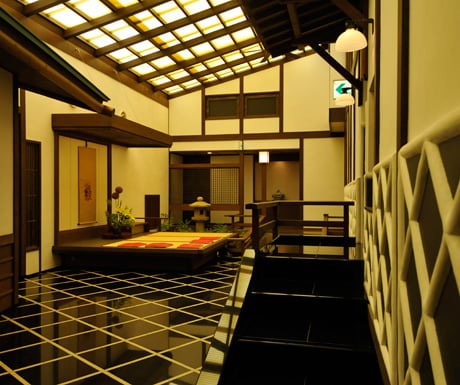 The ryokan is located in the beautiful Bikan district of Kurashiki, where white-walled warehouses and Edo-period merchant residences overlook a lovely, willow-lined canal. Housed in a beautiful old building, the five maisonette-style suites are unusual amongst Japanese inns in that they are furnished with carefully selected antiques and equipped with Western-style double beds.
The ryokans exquisitely landscaped garden is a real highlight. There can be few things more sophisticated or quintessentially Japanese than enjoying a delicious kaiseki dinner on a spring evening, with the screen doors thrown open and the garden lit up before you.
2. Gora Kadan, Hakone
Built in the 1930s as the summer residence of Japans Imperial Family, the Gora Kadan is one of Japans finest and most exclusive ryokan. From here, guests have access to all the wonderful attractions of Hakone, one of Japans most popular hot spring regions, set in a beautiful national park overlooked by Mount Fuji.
The ryokan is located in the beautiful Bikan district of Kurashiki, where white-walled warehouses and Edo-period merchant residences overlook a lovely, willow-lined canal. Housed in a beautiful old building, the five maisonette-style suites are unusual amongst Japanese inns in that they are furnished with carefully selected antiques and equipped with Western-style double beds.
The ryokans exquisitely landscaped garden is a real highlight. There can be few things more sophisticated or quintessentially Japanese than enjoying a delicious kaiseki dinner on a spring evening, with the screen doors thrown open and the garden lit up before you.
2. Gora Kadan, Hakone
Built in the 1930s as the summer residence of Japans Imperial Family, the Gora Kadan is one of Japans finest and most exclusive ryokan. From here, guests have access to all the wonderful attractions of Hakone, one of Japans most popular hot spring regions, set in a beautiful national park overlooked by Mount Fuji.
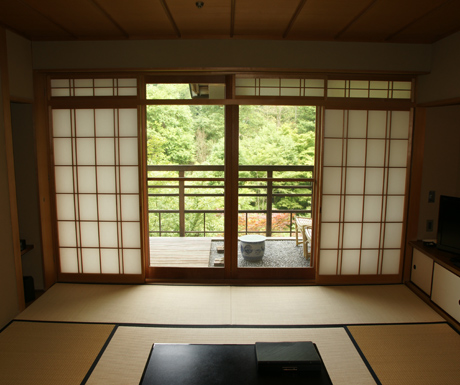 The inn has its own private hot spring source, beautiful tatami-style rooms with cypress baths, a heated indoor swimming pool, and meals prepared by one of Japans top kaiseki chefs. Meanwhile, its position tucked away amid stunning mountain surroundings creates a real sense of isolation from the hubbub of Hakones famous sights. All this, and only a short bullet train journey from Tokyo.
3. Jiji no Ie, Boso Peninsula
Jiji no Ie, or Grandpas House, is the brainchild of bestselling vegetarian cookbook writer Deco Nakajima and her husband, the photographer Everett Kennedy Brown. Their beautiful inn was built by some of Japans foremost sustainable architects, craftsmen and gardeners using traditional materials and techniques, in a style true to Japanese principles of simplicity without pretence. Meals are home-cooked by Deco herself, with seasonal, macrobiotic ingredients sourced from the ryokans own farm called Browns Field.
The inn has its own private hot spring source, beautiful tatami-style rooms with cypress baths, a heated indoor swimming pool, and meals prepared by one of Japans top kaiseki chefs. Meanwhile, its position tucked away amid stunning mountain surroundings creates a real sense of isolation from the hubbub of Hakones famous sights. All this, and only a short bullet train journey from Tokyo.
3. Jiji no Ie, Boso Peninsula
Jiji no Ie, or Grandpas House, is the brainchild of bestselling vegetarian cookbook writer Deco Nakajima and her husband, the photographer Everett Kennedy Brown. Their beautiful inn was built by some of Japans foremost sustainable architects, craftsmen and gardeners using traditional materials and techniques, in a style true to Japanese principles of simplicity without pretence. Meals are home-cooked by Deco herself, with seasonal, macrobiotic ingredients sourced from the ryokans own farm called Browns Field.
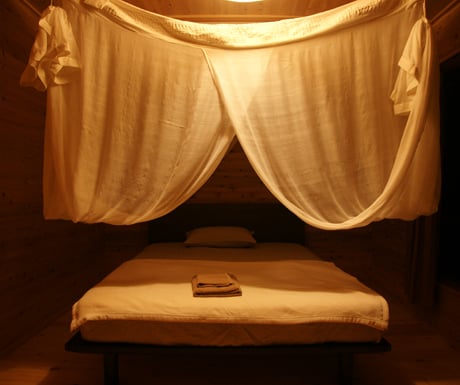 For those looking for a digital detox, Jiji no Ie is the perfect place to divest yourself of your technological shackles and reconnect with the simple life. Just an hour and a half from Tokyo, we recommend opting for Jiji no Ie as an alternative to the big city for a peaceful introduction or conclusion to your time in Japan.
4. Jinpyokaku Honten, Yudanaka Onsen
Unassuming and elegant, the Jinpyokaku Honten is a wonderful mountain retreat in the tiny hot spring town Yudanaka Onsen. Other than some pretty wood-panelled streets and traditional bathhouses, theres very little to do in Yudanaka and its a good thing too, because once you check in, we can guarantee you wont want to leave.
For those looking for a digital detox, Jiji no Ie is the perfect place to divest yourself of your technological shackles and reconnect with the simple life. Just an hour and a half from Tokyo, we recommend opting for Jiji no Ie as an alternative to the big city for a peaceful introduction or conclusion to your time in Japan.
4. Jinpyokaku Honten, Yudanaka Onsen
Unassuming and elegant, the Jinpyokaku Honten is a wonderful mountain retreat in the tiny hot spring town Yudanaka Onsen. Other than some pretty wood-panelled streets and traditional bathhouses, theres very little to do in Yudanaka and its a good thing too, because once you check in, we can guarantee you wont want to leave.
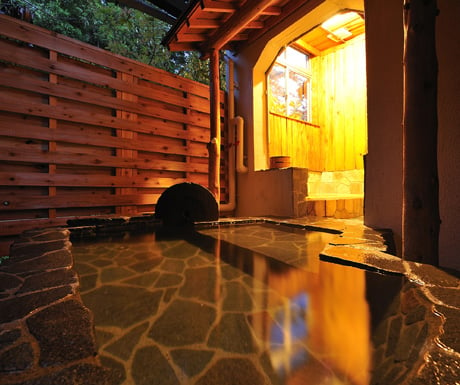 The ryokan has just six suites, each of which is beautifully finished, spacious, and set in its own individual building to ensure a sense of seclusion from the other guests. Every guestroom has its own private hot spring bath, and the inn has a wonderful set of communal baths including a huge, mixed-gender outdoor onsen. A daunting prospect, you might think but with only a handful of other guests, its often deserted.
The Jinpyokaku Honten has the additional benefit of being just footsteps from the entrance to the Jigokudani Monkey Reserve, where a group of Japanese macaques have learned to stave off the cold by soaking in the natural hot springs that bubble up through the rocks. We advise that you do the same!
5. Lamp no Yado, Noto Peninsula
Lamp no Yado is one of the most beautiful and romantic inns in Japan. The 150-kilometre drive from Kanazawa to the ryokan takes you deep into the rugged countryside of the Noto Peninsula, until you alight on a tiny, secluded cove. Here, at the bottom of a cliff overlooking the crashing waves, is the wonderful Lamp no Yado.
The ryokan has just six suites, each of which is beautifully finished, spacious, and set in its own individual building to ensure a sense of seclusion from the other guests. Every guestroom has its own private hot spring bath, and the inn has a wonderful set of communal baths including a huge, mixed-gender outdoor onsen. A daunting prospect, you might think but with only a handful of other guests, its often deserted.
The Jinpyokaku Honten has the additional benefit of being just footsteps from the entrance to the Jigokudani Monkey Reserve, where a group of Japanese macaques have learned to stave off the cold by soaking in the natural hot springs that bubble up through the rocks. We advise that you do the same!
5. Lamp no Yado, Noto Peninsula
Lamp no Yado is one of the most beautiful and romantic inns in Japan. The 150-kilometre drive from Kanazawa to the ryokan takes you deep into the rugged countryside of the Noto Peninsula, until you alight on a tiny, secluded cove. Here, at the bottom of a cliff overlooking the crashing waves, is the wonderful Lamp no Yado.
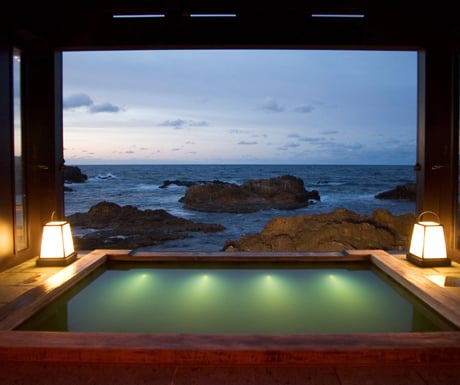 Every beautifully finished guestroom boasts an outdoor hot spring bath looking out to sea, where guests can relax to the sound of the surf. The inns centrepiece is its infinity pool, tastefully lit and complete with floating shrine: especially beautiful as dusk falls. We recommend visiting in winter, when the ryokan is blanketed in snow and the sea is at its most dramatic.
Alastair Donnelly is Director at InsideAsia Tours.
If you would like to be a guest blogger on A Luxury Travel Blog in order to raise your profile, please contact us.
Every beautifully finished guestroom boasts an outdoor hot spring bath looking out to sea, where guests can relax to the sound of the surf. The inns centrepiece is its infinity pool, tastefully lit and complete with floating shrine: especially beautiful as dusk falls. We recommend visiting in winter, when the ryokan is blanketed in snow and the sea is at its most dramatic.
Alastair Donnelly is Director at InsideAsia Tours.
If you would like to be a guest blogger on A Luxury Travel Blog in order to raise your profile, please contact us.Did you enjoy this article?
Receive similar content direct to your inbox.


True ~ “flashy” has no place in the Japanese aesthetic, except for, perhaps, the sets and costumes of the Takarazuka Revue! ;)
The word that most often comes to my mind is “serene.” Each of your selections here is serenely beautiful.
Having been to a ryokan inn myself in Kyoto, I can surely appreciate the experiences of one. It gives you the feel of old traditional lifestyle in Japan.
I particularly like the Gora Kadan. The idea of it being near Mount Fuji is very appealing. I may have to go back again.
Beautiful places. I love the Japanese style, the simplicity, yet at the same time it feels comfortable. I spent 3 weeks in Japan and the places we stayed always had a zen-like feel to them. I particularly like their baths.